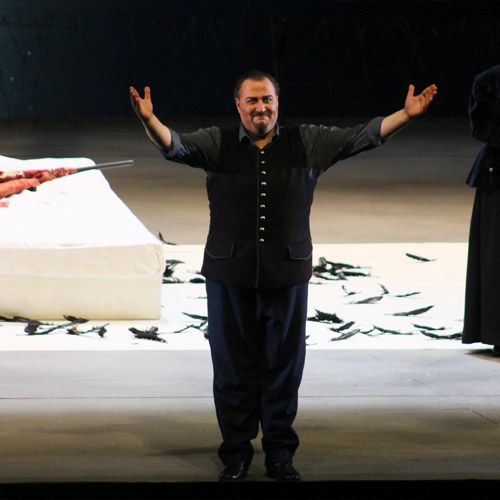
Review
|
13.03.2019
Otello – Opéra Bastille 2019
“The French tenor had a stupendous partner in the baritone George Gagnidze, who had the part of Iago and interpreted it with vocal excellence, with an ample range of expression and he brought out the text extraordinarily. I am tempted to say that without doubt this is the best I have heard Gagnidze to date.”
Alejandro Martínez, Platea Magazine
“George Gagnidze makes a solid Jago, always fair and expressive… [H]e knows how to raise the sound level when the score requires it, launching a thunderous credo…. ”
Tristan Labouret, Bachtrack
“… the malicious intrigue of the devious Iago, George Gagnidze”
Wilhelm Sinkovicz, Die Presse
“The French tenor had a stupendous partner in the baritone George Gagnidze, who had the part of Iago and interpreted it with vocal excellence, with an ample range of expression and bringing out the text extraordinarily. I am tempted to say that without doubt this is the best I have heard Gagnidze to date.”
Alejandro Martínez Platea Magazine
“The baritone George Gagnidze who plays the role of the devilish Iago, has an identifiable vocal signature and plays a sober game with finesse. This production is an announced triumph.”
Jean-Christophe Mary, Paris Capitale Magzine
“George Gagnidze makes a solid Jago, always fair and expressive… [H]e knows how to raise the sound level when the score requires it, launching a thunderous credo…. ”
Tristan Labouret, Bachtrack
“Incisive, strong, and lively, he never lets the public come to like him.”
Max Yvetot Opera Gazette
“The Georgian baritone avoids all theatrical and vocal histrionism: the vocal effects are … effective. Served by a neat diction, his Iago is dark and worrying at will.”
Stéphane Lelièvre, Olyrix
“George Gagnidze makes an imposing Iago with a very composed physicality and character. …[T]he voice knows how to refine itself in the sotto voce while still retaining its intensity: the voice flows through the entirety of the Bastille constantly supported, leaning on the great roundness of dark toned vocal depth, stretching towards a lyrical treble. Gagnidze also saves his means and effects for the highlight of his part: the terrible impious Credo, with long and intense breath, cutting through the brass. The staging even presents this tune in a recital version: the black curtain falls behind Iago and a hand stretched from behind the scenes offers him a skull to which he addresses himself, thereby reinforcing the Shakespearean effect.”
Charles Arden Olyrix
“George Gagnidze … assumes and fully assures his role, further enhancing the intensity of his acting, the darkness of his vocal character as well as his ease and his knowledge of the mise-en-scène With wisdom, Gagnidze knows how to present his energy and his colossal stature. ”
Charles Arden, Olyrix
“George Gagnidze is still Iago, with the same qualities such as a great vocal command (for once, we hear the trills), a clear timbre (…) (…) It remains nonetheless that the electrifying finale of Act II, the duet with Gregory Kunde, is simply grandiose.”
Jean Michel Pennetier, Forum Opéra
” [T]he baritone is very convincing in the gall and duplicity thanks to a superb phrasing and a voice very well conducted, offering nuances that move away vociferous Iago.”
Steeve Boscardin, ResMusica
“Verdi had once thought of baptizing his opera” Jago “, as the whole plot is based on the officer’s schemes.True keystone and strategist of a sinister drama, Jago is interpreted by George Gagnidze, convincing because of his imposing stature and the dark accents of his timbre. He plays a more Machiavellian than demonic character, who manipulates the strings of evil and paralyzes the Moor’s clairvoyance, is happy about the fact that “the poison works”, then is delighted to see his endeavor carry his deadly results. (…) his voice is deep and sonorous, the light middle register has beautiful colors. ”
Quentin Laurens, WebThéâtre
“Georges Gagnidze plays an Iago who expresses his dark designs without difficulty and finds sufficiently perverse ways to play the sinister comedy that will lead Otello to his ruin….”
Paul Faurier, Toute La Coulture
“George Gagnidze also made his contribution with steady and secure voice”
Jaume Estapà, Opera Actual
“…and the viperous Iago of George Gagnidze”
Classica
“Baritone George Gagnize is a credible, devious and cunning Iago.”
Françoise Krief, Planete Campus
“For his part, George Gagnidze offers an honorable performance in Iago. He knows how to bring to the character that it takes sneakiness, even if its game remains very agreed. Gagnidze is excellent: his voice is more de-toned but wins in accuracy. The baritone is superb when he instils in Otello the poison of jealousy and doubt in his air “Era la notte, Cassio dormÌa ».
Floriane Goubault, Avant Scene OPÉRA
“The only spot on performance comes from George Gagnidze, Iago, who voluminous timbre is never clouded”
Vincent Guillemin, AltaMusica
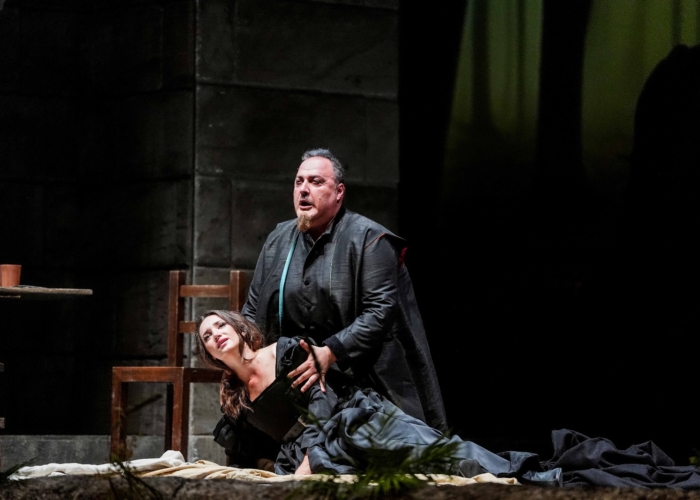
Review
|
15.11.2024
George Gagnidze is a “powerful, compelling, imposing” Rigoletto in Catania
"Giuseppe Verdi's opera conducted by an expert Verdian conductor. And the world of “courtiers” revolves around Gagnidze's voice.” "The poisoned world of ‘courtiers, vil razza dannata’ revolves around him, but he is the one who makes the scene-world revolve. And let us praise the Rigoletto of baritone George Gagnidze, Georgian, powerful, compelling, imposing Falstaff-like physique yet highly agile, mimetic, direct, ruthless, and broken. And what does it matter that he exhibits no mountainous humps or right-angle posture? His “diversity” is riveting and deadly. For everyone. He is a hypnotic “singing actor.” Gagnidze shows excellent declamation and phrasing and a remarkable word command. And all this is much more than a corollary to his expressive and happily “bulky” physicality that reminds one in no small part of Ambrogio Maestri, an immense exponent of the highest craftsmanship of theater in music.” “The magnificent “father” (of Gilda, ed.) Gagnidze!” Carmelita Celi, La Sicilia
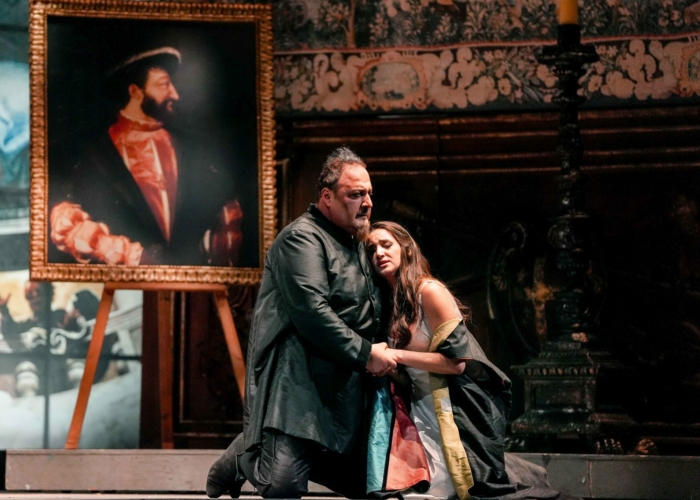
Review
|
30.10.2024
Interview with La Sicilia
On the occasion of his debut at the Teatro Massimo Bellini of Catania, George Gagnidze spoke with the largest Sicilian newspaper, La Sicilia:
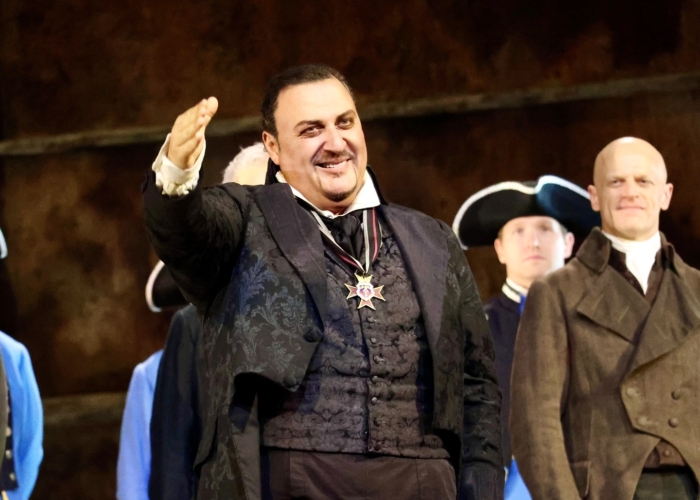
Review
|
25.10.2024
Press review “Tosca”, Metropolitan Opera 2024
“George Gagnidze as Baron Scarpia is Haunting” “OperaWire reported back in January 2023 about George Gagnidze singing his 100th performance of Scarpia in “Tosca” on Jan. 21, 2023. In a statement, Gagnidze said, “The role of Scarpia has been having a great impact on my entire career. Almost 20 years ago, I made my debut in this thrilling part when I was a member of the company of the Osnabrück Opera in Germany. I feel very privileged to have since then had the honor to perform this character on so many great stages and with some of the best conductors. Even though ‘Tosca’ is one of Puccini’s most popular and most performed operas, I think it is also one of these eternal masterpieces one can see on stage countless times and every single time it is gripping. For us singers it is the same on stage, and my 100th performance on Saturday at the Gran Teatre del Liceu will certainly be as thrilling for me as the previous 99 shows.” The Met Opera’s choice, for this season, to pair Gagnidze with Aleksandra Kurzak was an excellent decision. Gagnidze’s baritone is bone-chilling good. His voice rattles the soul and definitely caused a stir in Kurzak’s soprano during the “Tosca’s kiss” scene. Realizing Gagnidze’s greatness in this role is easy, however, recognizing the how deeply his castmates resonate with his performance is an infinite process. This is something I am still thinking about today. Gagnidze’s voice and presence as Scarpia is timeless, leaving zero doubt about how much he has processed this role beforehand. But, there is also a newness in his portrayal, especially as he is attacking Tosca and not expecting her “kiss.” Gagnidze has a gift for staying in the present moment and not getting ahead of himself. He is also (as I wrote above about Kurzak as Tosca) verismo personified. His aria, “Va, Tosca! Nel tuo cor s’annida Scarpia”, at the end of Act one with the Met Opera Chorus (celebrating a religious mass procession at stage right) and the orchestra including bell tolls, the newly restored Æolian-Skinner pipe-organ, and two canons, is absolutely my favorite moment in this production and with this particular cast. Gagnidze’s voice is breathtaking and terrifyingly honest as his Scarpia promises to “dig a nest in Tosca’s heart.” I could listen to this single moment again and again, the chorus was fantastic and the pipe-organ roared. Scarpia’s aria in Act two, “Tosca è un buon falco!”, resonated in Gagnidze’s voice as he contemplated exactly how to trap Tosca, busying himself about his Palazzo Farnese. The light fell gently in through the window behind him, illuminating his evil plot and realizing the graveness of his existence. Gagnidze voices Scarpia’s plan with fortitude and frivolousness. His plan’s exactness lacks love and therefore opens the gates of hell to devour him whole. Gagnidze dives headfirst into Scarpia’s insanity. This is more than just evil or satanic, Gagnidze was made for this role. This is verismo at its finest!” Jennifer Pyron, Operawire

Review
|
27.07.2024
Interview Platea Magazine: “Verdi siempre ha sido mi compositor favorito”
El barítono de origen georgiano George Gagnidze es bien conocido en nuestro país por sus notables interpretaciones de roles de Verdi y Puccini, singularmente. El próximo domingo 4 de agosto, el XVI Festival Lírico Ópera Benicàssim acogerá un recital en solitario con su voz, acompañado al piano por José Manuel Frasquet.
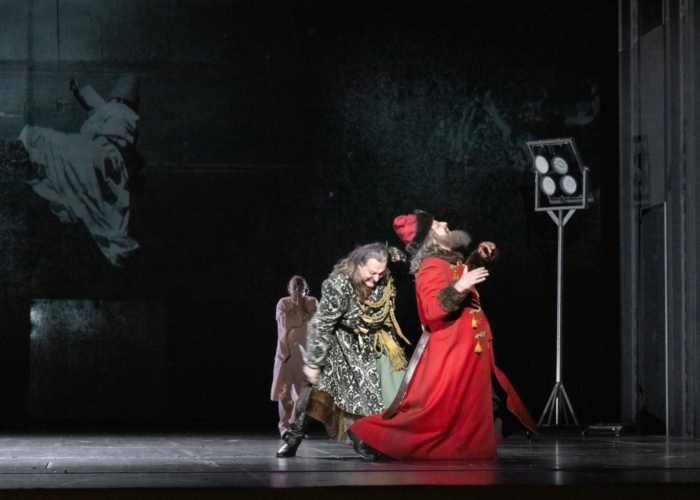
Review
|
27.06.2024
“George Gagnidze is outstanding as Shaklovity” in Berlin
Reviews are brilliant for the new production of Khovanshchina and George Gagnidze's Shaklovity at the Staatsoper Unter den Linden:




